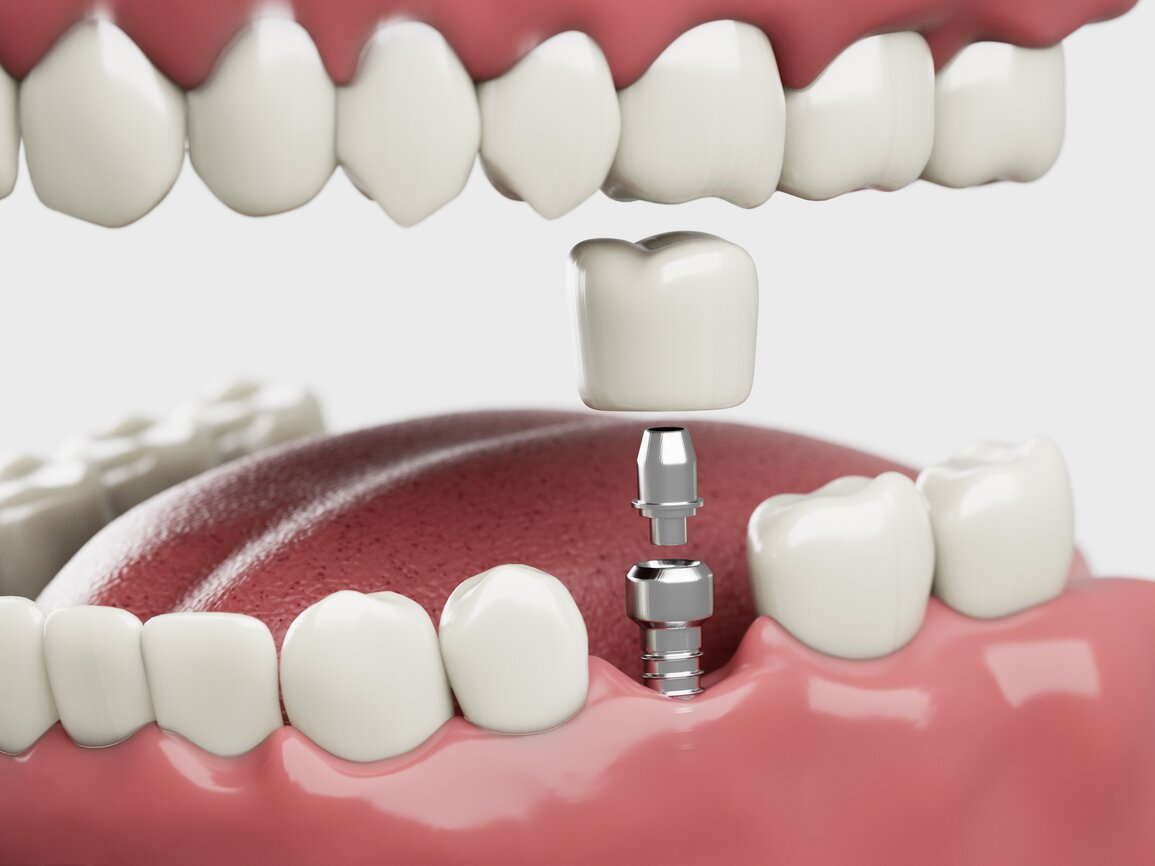Dental Implant - Restore Your Smile With Confidence
Center : Dental Center
Article by : Dr. Vudhibhong Laoamata

When natural teeth are lost, dentures can be used to replace the gaps. However, over time, problems arise as dentures become loose. This is partly due to the dissolution of the bone that supports the tooth roots, causing the gum ridge to collapse and making dentures ill-fitting.
Dental implants can help slow down the deterioration of the bone that supports tooth roots while improving the retention of dentures. Additionally, there's no need to grind down adjacent teeth next to the extraction site, ensuring no disturbance or loss of natural tooth structure whatsoever. This can be applied to enhance the retention of certain types of removable dentures in patients who have no remaining teeth in their mouth. It offers maximum efficiency in chewing, easy cleaning like natural teeth, and boosts confidence with a remarkable smile.
Table of Contents
- What is Dental Implant?
- How Does Dental Health Affect Overall Health?
- Objectives of Dental Implant
- Components of a Dental Implant
- The Different Types of Dental Implant
- Who Needs Dental Implant?
- Disadvantages of Dental Implant
- Preparation Before Dental Implant
- Procedural Steps of Dental Implant Surgery
- Dental Implant Aftercare
- How Long Does the Dental Implant Process Take?
- Benefits of Dental Implant
- Enhance Your Smile with Dental Implants at Nakornthon Hospital
- Free Online Consultation with a Specialist
What is Dental Implant?


A dental implant is a specially designed titanium material that is biocompatible with the human body. Shaped like a screw bolt, it is placed and anchored into the jawbone to replace the natural tooth root of a lost tooth. The dental implant serves as a substitute for the natural tooth root to support various dental prosthetics, including both removable and fixed dentures, ensuring excellent prosthetic retention. It also supports crowns or dental bridges that provide results most similar to natural teeth. Dental implant placement is considered a highly popular treatment in modern dentistry.
How Does Dental Health Affect Overall Health?
Tooth decay and tooth extraction have multifaceted impacts. Severe tooth decay reduces chewing efficiency, making the digestive system work harder and potentially leading to nutritional problems. When teeth are extracted, adjacent teeth will tilt and opposing teeth will over-erupt, causing abnormal bite patterns and temporomandibular joint problems. Furthermore, the jawbone in areas without teeth will gradually deteriorate, making the face appear prematurely aged. The absence of teeth, especially front teeth, also affects speech, causing unclear pronunciation and reducing confidence in communication, as well as diminishing the beauty of one's smile. Untreated tooth decay may spread to the pulp chamber, causing severe pain and infections.
Dental implants are therefore a crucial solution because they function like natural tooth roots, helping maintain jawbone condition and preventing deterioration. They restore excellent chewing efficiency, prevent tooth tilting, and help normalize speech. Additionally, they restore the beauty of your smile and increase confidence in daily life, making dental implant placement a worthwhile investment for long-term oral health.
Objectives of Dental Implant
Dental implants are placed to replace natural teeth that have been damaged by tooth decay, gum disease, tooth extraction, accidents causing tooth loss, or congenital missing teeth (tooth agenesis). When multiple teeth are lost, dentists can diagnose and place multiple dental implants to serve as a foundation for supporting dental bridges or removable dentures.
Components of a Dental Implant
- Implant Body or Fixture : The screw-like or bolt-like component that is embedded into the jawbone to integrate with the bone structure, functioning as an artificial tooth root.
- Implant Abutment : The connecting component that links the dental implant to the crown or prosthetic support structure.
- Crown : The ceramic tooth portion that matches the color and mimics the natural shape of real teeth.
- Prosthetic Component : The artificial dental portion, such as bridge crowns or removable dentures that attaches to the crown support structure using dental cement or screws.
The Different Types of Dental Implant


Dental implant placement can be categorized into three types :
- Conventional or Traditional Implant—After tooth extraction, there is a 2-3 month waiting period to allow complete healing of the extraction site. Then the implant is placed and time is allowed for complete integration with the jawbone. Once the bone has integrated with the implant surface, a crown is placed on the dental implant.
- Immediate Implant—Placed immediately after tooth extraction to reduce the number of surgeries and trauma for the patient. After tooth extraction, the dental implant is placed immediately. Following implant placement, there is a 2-3 month waiting period to allow proper bone integration with the implant before placing the crown and final prosthetic on the implant. This is suitable for front teeth or back teeth with adequate bone volume.
- Immediate Loaded Implant—This approach saves time by combining implant placement and crown placement in one procedure, allowing patients to have functional teeth while waiting for the implant to integrate with the bone.

Who Needs Dental Implant?
- Individuals who have lost natural teeth and are 18 years or older
- Those with cracked, chipped, or broken teeth that dentists recommend for extraction, who can have dental implants to replace the lost teeth
- Individuals who prefer not to wear removable dentures
- Those who don't want to grind down adjacent teeth for fixed bridge work
- People who want their teeth to look as natural as possible
- Those who want to smile and build confidence
- Individuals seeking to improve their chewing efficiency
- People who need to replace weak teeth that cannot serve as primary anchors for other types of dental prosthetics
Disadvantages of Dental Implant
Those considering dental implants should first assess themselves for risk factors, or if uncertain, consult with a dentist for a detailed diagnosis before deciding on dental implant treatment. The limitations include :
- Individuals under 18 years of age, as the jawbone has not fully developed
- Pregnant women should wait until after delivery before getting dental implants
- Those with uncontrolled chronic conditions such as diabetes, which increases risks of slow wound healing, inflammation, and infection
- Patients receiving radiation therapy for cancer in the face and jaw area
- Patients with osteoporosis or weakened bone conditions
- Patients with severe periodontal disease should receive additional treatment before dental implant placement
- Patients with leukemia, hyperthyroidism, and those receiving immunosuppressive medications
- Patients with psychiatric conditions or those with muscle control problems, and those unable to maintain oral hygiene independently
- Heavy smokers and those unable to quit smoking
Preparation Before Dental Implant


Undergo thorough examination and assessment by a dental specialist to develop a treatment plan, including determining the number of dental implants needed, whether bone grafting is required, and if orthodontic treatment is necessary. If you have any medical conditions, inform your dentist.
The doctor will create a treatment plan using computer guided implant surgery combined with 3D radiographic imaging, oral scanning, and dental impressions to design the correct and appropriate position for each individual's dental implants. This reduces implant placement errors, minimizes trauma to surrounding tissues, reduces wound size, and decreases patient discomfort.
Subsequently, equipment will be designed and implant positions determined, then sent to the laboratory for 3D printing of surgical guides for use in dental implant surgery. Additionally, maintaining good oral hygiene is crucial for patients to practice before receiving treatment.
Procedural Steps of Dental Implant Surgery
After the dentist examines the oral condition and prepares the mouth appropriately, the procedure follows these steps :
- Surgery Day : The surgical guide or implant positioning device is used to place the dental implant in the precise location.
- Implant Placement : The dentist performs surgery to place the dental implant in the appropriate position, taking approximately 1-2 hours. In some cases, bone grafting may be performed first.
- Healing Period : Wait for the bone to integrate with the dental implant, which takes approximately 2-3 months.
- Impression Taking : Once the bone has integrated well with the dental implant, the dentist takes impressions to create bridges, crowns, or dentures.
- Final Restoration : The abutment is placed, followed by the installation of bridges, crowns, or dentures.
Dental Implant Aftercare


Dental implants will not decay, but they can develop gum inflammation if not properly cared for. Caring for dental implants can be done the same way as caring for natural teeth, as follows :
- Strictly follow your dentist's instructions after dental implant surgery is completed
- Use a soft-bristled toothbrush, as it's effective for removing food debris and bacterial plaque, which may cause implant loosening
- Brush your teeth properly along with using dental floss
- During the recovery period after implant placement, avoid any activities that might severely impact the prosthetic tooth
- In the initial period, avoid consuming strongly flavored foods, very sour, very sweet, and very hot foods, high-acid foods, hard foods, or foods requiring heavy chewing force
- Receive regular implant dentistry checkups with your dentist, similar to general dental health examinations
How Long Does the Dental Implant Process Take?
The total time for dental implant treatment is approximately 2-4 months. This depends on various oral factors, including the quantity and quality of jawbone, which may require bone strengthening procedures, the number of teeth requiring implant placement, and other individual considerations.
Benefits of Dental Implant


- Natural-Looking Teeth : Specialist dentists design the shape and color of crowns on implants to closely match the color of natural teeth as much as possible
- Long-Lasting Durability : Dental implants have a very long lifespan and are extremely durable. Typically, tooth implants can last 20 years or more, depending on the implant location, patient's oral health care, and regular dental visits as scheduled
- Optimal Chewing Efficiency : Provides chewing performance similar to natural teeth
- Eat Any Food : Can consume all types of food without worry when in front of others
- Improved Speech : Helps with pronunciation and speech clarity
- Bone Preservation : Helps reduce dissolution of the bone ridge that supports prosthetic teeth
- Easy Cleaning : Teeth can be cleaned easily
- No Side Effects : Dental implant placement does not negatively affect remaining teeth
Enhance Your Smile with Dental Implants at Nakornthon Hospital
Dental implants are a highly popular and effective solution for tooth loss because they can replace both the tooth root and the tooth itself, comprehensively addressing tooth decay, tooth extraction, and multiple impacts on oral health and overall quality of life. Considering dental implants is therefore an investment in long-term oral health and quality of life.
Where to get the best dental implants? Nakornthon Hospital's Dental Center provides dental implant services equipped with advanced computer guided implant surgery technology for pre-implant planning, enabling more efficient and precise positioning and sizing of dental implants. This reduces recovery time, minimizes wound size, and shortens surgery duration.
For more information, please contact:
- - Website : https://en.nakornthon.com
- - Facebook : Nakornthon Hospital - International Patient
- - Line : @nakornthoninter
- - Tel: 02-450-9999 (Available 24 hours)
Free Online Consultation
Article of Dental Center






